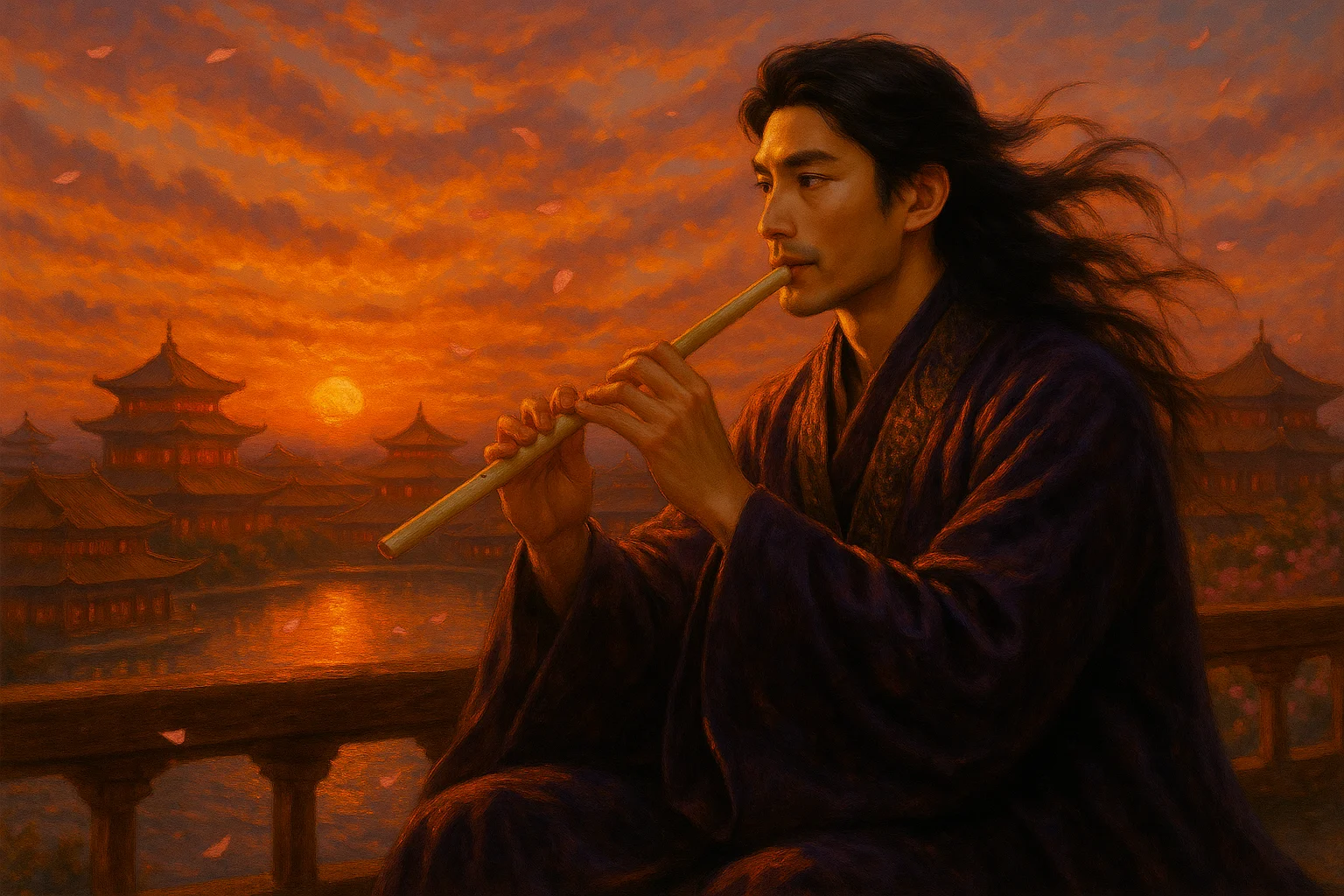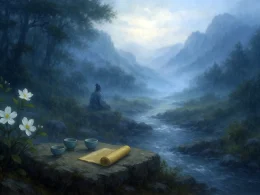The golden breeze blows softly by;
Leaf on leaf, the wutong trees sigh.
One sip of green wine makes me drunken soon;
On windowsill I sleep till afternoon.
The red hibiscus and purple mallow fade;
The slanting sun still lights the balustrade.
Now is the time for swallows to return;
Last night my silver screen felt chill in turn.
Original Poem
「清平乐 · 金风细细」
金风细细。叶叶梧桐坠。
绿酒初尝人易醉。一枕小窗浓睡。紫薇朱槿花残。斜阳却照阑干。
晏殊
双燕欲归时节,银屏昨夜微寒。
Interpretation
This poem is believed to have been composed in autumn, during Yan Shu's time as a high-ranking official when he enjoyed prominence and prestige. Although the exact year and circumstances of its creation are difficult to determine, the serene yet melancholic atmosphere and the scenes of leisurely refinement in the poem align well with the later years of Yan Shu's life. By this time, the poet had attained a high status, and his style had matured, shifting from the brilliance of his early works to more profound and emotionally nuanced pieces. Through the tranquil autumn courtyard and fleeting moments of daily life, the poem conveys the poet's reflections on the passage of time and the transience of life.
First Stanza: “金风细细。叶叶梧桐坠。绿酒初尝人易醉。一枕小窗浓睡。”
Jīn fēng xì xì. Yè yè wú tóng zhuì. Lǜ jiǔ chū cháng rén yì zuì. Yī zhěn xiǎo chuāng nóng shuì.
A gentle autumn breeze rustles, / Leaves of the parasol tree fall one by one. / Sipping light green wine, one easily grows tipsy, / Then slumbers deeply by the small window.
The opening lines use "golden wind" (jīn fēng) to signify autumn, hinting at the deepening season. The falling parasol leaves symbolize the passage of time, carrying a sense of quiet melancholy. "Green wine," "small window," and "deep sleep" depict a life of refined leisure, yet with a faint touch of wistfulness. This stanza focuses on stillness and idle contemplation, with soft hues and delicate strokes—elegant in tone yet tinged with subtle sorrow.
Second Stanza: “紫薇朱槿花残。斜阳却照阑干。双燕欲归时节,银屏昨夜微寒。”
Zǐ wēi zhū jǐn huā cán. Xié yáng què zhào lán gān. Shuāng yàn yù guī shí jié, yín píng zuó yè wēi hán.
The crape myrtle and hibiscus wither, / Yet the setting sun still shines on the rails. / It’s the season when paired swallows prepare to depart, / Last night, the silver screen carried a slight chill.
The second stanza continues the imagery of fading beauty—"withered flowers" and "slanting sunlight" evoke the desolation of autumn. The swallows preparing to leave symbolize the changing seasons and hint at emotional solitude. "The silver screen’s slight chill" deepens the poem’s mood through tactile sensation, conveying an unspoken melancholy and the quiet emptiness brought by the turn of seasons.
Holistic Appreciation
Set against an autumnal backdrop, this lyric poem traces falling wutong leaves to fading flowers in slanting sunlight, then to returning swallows and silvered cold—conveying, through serene yet opulent imagery, a subtle undercurrent of solitude and melancholy. The first stanza seamlessly blends scene and sentiment, where leisure within wealth carries hints of pensive sorrow; the second stanza deepens reflection with autumn light, floral shadows, homing swallows, and western glow—all quietly amplifying the poet’s musings on time’s passage and imperceptibly shifting years. The language is exquisitely crafted, the palette soft, the rhythm unhurried, reading like a meticulously painted courtyard in autumn—its surface splendor faintly revealing inner solitude and life’s deeper flavors.
Artistic Merits
The poem’s most striking feature is its fusion of seemingly opposing styles: "elegant leisure" and "opulent grace." It balances the refined tranquility of "wutong trees in twilight" and "slumber behind silver screens" with aristocratic touches like "green wine by small windows" and "beaded curtains in lofty halls." Yan Shu, from his privileged position, skillfully inherits Feng Yansi’s delicate lyricism while channeling Wen Tingyun’s dignified splendor—yet his "opulence" lies not in ornate diction but in the natural流露 of lifestyle and aesthetic taste. As Wang Guowei observed, "Yan Shu sings of wealth yet retains a purity of spirit"—and this poem exemplifies that very quality.
Insights
Beyond painting a quiet autumn courtyard, this work unveils the poet’s complex inner world: contentment and leisure within comfort, yet also unanticipated sorrow amid time’s flow. It reminds us that even amidst prosperity, one cannot escape deeper reflections on life’s transience and solitude. By embedding melancholy within scenic description, the poet displays both artistry and philosophical insight. The poem teaches us that true refinement lies not in material wealth alone, but in maintaining a sensitive heart—discerning life’s warmth and depth in its subtlest details.
Poem Translator
Xu Yuanchong (许渊冲)
About the Poet

Yan Shu (晏殊 991 – 1055) Originaire de Fuzhou dans le Jiangxi, Yan Shu fut le maître fondateur de l'école wanyue (élégante et retenue) de la poésie ci sous les Song du Nord. Enfant prodige entré dans l'administration à quatorze ans, ses ci allient noblesse classique et méditation philosophique dissimulée sous des évocations de prospérité raffinée. Mentor de talents comme Fan Zhongyan et Ouyang Xiu, il initia l'École du Jiangxi en poésie ci et posa les bases de l'épuration du genre sous les Song.












